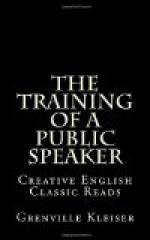Of a similar kind is an ornament which not only represents things, but does so in a lively and concise manner. Undoubtedly a conciseness in which nothing is lacking, is deservedly praised; that which says precisely only what is necessary, is less estimable; but that which expresses much in a few words is of all the most beautiful.
Eloquence does not think it enough to show of what it speaks, in a clear and evident manner; it uses, besides, a variety of other expedients for embellishing a discourse. Thus it is that a simple and unaffected style is not without beauty, but it is a beauty entirely pure and natural, such as is admired in women. Beauty is also annexed to propriety and justness of expression, and this beauty is the more elegant as it shows but little care. There is an abundance that is rich, an abundance that smiles amidst the gaiety of flowers, and there is more than one sort of power, for whatever is complete in its kind can not be destitute of its proper strength and efficacy.
COMPOSITION AND STYLE
I well know that there are some who will not sanction any care in composition, contending that our words as they flow by chance, however uncouth they may sound, are not only more natural, but likewise more manly. If what first sprang from nature, indebted in nowise to care and industry, be only what they deem natural, I admit that the art of oratory in this respect has no pretensions to that quality. For it is certain that the first men did not speak according to the exactness of the rules of composition; neither were they acquainted with the art of preparing by an exordium, informing by a narration, proving by arguments, and moving by passions. They were deficient in all these particulars, and not in composition only; and if they were not allowed to make any alterations for the better, of course they would not have exchanged their cottages for houses, nor their coverings of skins for more decent apparel, nor the mountains and forests in which they ranged for the abode of cities in which they enjoy the comforts of social intercourse. And, indeed, what art do we find coeval with the world, and what is there of which the value is not enhanced by improvement? Why do we restrain the luxuriance of our vines? Why do we dig about them? Why do we grub up the bramble-bushes in our fields? Yet the earth produces them. Why do we tame animals? Yet are they born with intractable dispositions. Rather let us say that that is very natural which nature permits us to meliorate in her handiwork.




